Well, I tried.
Despite being a dirty ex-partisan, according to a common strain of responses to my columns and tweets, I tried.
I tried to be calmly rational and precise about what Liberal MP Iqra Khalid’s Motion M-103 does and doesn’t say about speech and the law, and to defend it against both ignorant and calculated hysteria.
When Rebel Media sent out emails claiming that “Canada is on the verge of passing a law that would prohibit criticizing Islam” and that “If this motion passes, Canadians can be persecuted for expressing any criticism of Islam, even when warranted,” I pointed out that M-103 is a motion, not a law, and that it will not change a single comma of existing speech legislation.
I noted that M-103 does not include the word “speech” or mention criminalization. Nor does it “single out” one religion for special treatment, as some critics claim. Where it mentions “Islamophobia,” it also refers also to all other “forms of systemic racism and religious discrimination.” That is the opposite of singling out.
Sure, parts of the motion read like they were drafted by a freshmen sociology student. And, yes, the term “Islamophobia” would benefit from some definition or context, as former Liberal Justice Minister Irwin Cotler recommended. (Though reasonable minds will agree that the Sainte Foy massacre and some of the protests outside Toronto’s Masjid mosque fit the description.)
These are all valid objections, but they do not change the fact that M-103 has no legal bite.
If Members are concerned about endorsing the ambiguous reach of a term like Islamophobia, they can clarify how they interpret the term, both on the floor of the House and in letters to their constituents. Then they can support or oppose the motion on the basis of that good faith reading, and move on.
This is likely what would have happened, had the motion not come up for debate in the home stretch of the Conservative Party leadership race. As if to prove the point, another motion condemning Islamophobia passed unanimously last October without provoking misinformation campaigns and the concomitant need to counter uninformed and cynical opposition.
But after last week, I’m not going to waste any more breath reassuring concerned Canadians. I’m done repeating (accurately) that a motion cannot change the law and that this particular motion doesn’t even mention free speech. I’m standing down because, according to the Prime Minister and another Liberal MP, I’m wrong and M-103 really is about limiting speech.
Questioned at a town hall in Yellowknife, Justin Trudeau defended motion M-103 by saying that “You’re not allowed to call ‘Fire!’ in a crowded movie theatre and call that free speech. That endangers our community.”
Then, on Friday, Liberal MP Ken Hardie, who had earlier said he was “inclined not to support” the motion, was asked on Twitter why he had changed his mind. He replied that he is now convinced that “We need a way to deal appropriately with broadcasters who appeared to have incited hatred in the Quebec City attack.”
What odd responses, if M-103 is simply a motion condemning Islamophobia and not part of a wider plan to restrict speech.
In the 1990 case of R. v. Keegstra, then-Justice Beverley McLachlin wrote that limiting the guarantee of free expression to speech that is consistent with mainstream values would “strike at the very essence of the value of the freedom.” This is because, “[i]f the guarantee of free expression is to be meaningful, it must protect expression which challenges even the very basic conceptions about our society.”
Ken Hardie’s desire to “deal with” radio broadcasters and the Prime Minister’s inapt and inept reference to “shouting fire” suggest that they would welcome further limits on the right to free speech, beyond existing laws against hate speech and incitement. They also make it almost impossible for those who have tried to soothe fevered speculation about the endgame of M-103 to continue doing so.
I tried, but I’m done.
If the prime minister and members of the Liberal caucus believe that M-103 has something to do with policing speech, then they have only themselves to blame if their opponents take them at their word.
(Image by Alex Guibord under CC 2.0).






